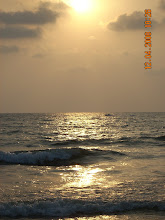
story by Eyad El-Sarraj..T_T |
For months, I waited in Gaza, unable to leave (despite my British passport) and increasingly desperate to secure a medical appointment about 45 minutes away in Israel. In the end, I waited three months for a medical permit to travel to treat my multiple myeloma in nearby Tel Aviv. My requests were denied repeatedly until an Israeli friend who teaches at Tel Aviv University intervened and helped me secure a one-day permit. That there are still Israelis willing to promote the rights of Palestinians provides me with what little hope I have these days. The majority of Palestinians want only to live with peace and equality, accepting Israelis as our neighbors — but not as our superiors or as our jailers. The situation in Gaza got worse early in November when Israel tightened its blockade. Our food, fuel and medical supplies have been severely limited. The blockade has ruined our economy and reduced many among us to a level of economic desperation that has alarmed United Nations officials. UN Secretary-General Ban Ki-moon recently called for the immediate easing of the closure because of “deprivations of basic supplies and human dignity.” The secretary-general rightfully condemned Palestinian rocket fire at civilian targets in Israel. Such rockets are morally wrong and strategically inept. Yet the blockade that Israel has clamped on 1.5 million Palestinians in Gaza is a collective punishment that harms men, women and children who have no power to control those firing the rockets. Rather than turn Gazans against Hamas, the blockade’s effect has been a humanitarian catastrophe that alienates Gazans young and old from both Israel and the West. Even I, a practicing psychiatrist for decades and a longtime advocate of coexistence between Palestinians and Israelis, am having trouble coping with the hardships to which we are subjected. Travel is crucial to me, not just for medical reasons but for reasons of basic sanity. I long to see dear friends, to see the world again, to breathe fresh air and, most of all, to reassure my senses that there are normal things and normal people outside Gaza’s debilitating confines. The last time I left Gaza, before this most recent medical trip, was several months ago, and the time I spent with friends in Ramallah and Jerusalem was rejuvenating. This time, however, I was only granted permission to leave for a day. At Erez checkpoint, where I left Gaza along with four other medical patients, Israeli soldiers spoke through loudspeakers and looked down at us through cameras. “Open your bag,” one shouted. When the woman in front of me asked a question, the soldier ordered her to take everything out of her suitcase. She was humiliated as she had to hold even her underwear up to the camera. I was made to walk through the X-ray machine three times, even though I told the soldiers it was dangerous because of my medical condition. The soldiers seemed intent not only to determine that we were not bombers but to shame us. What good can come of exercising such domineering power over medical patients? When one of the Israeli soldiers approached us, he was grinning and carrying a huge machine gun across his massive body. I thought that he must feel the power of his muscles and his gun as well as my weakness, with my frail body and my obedience to his orders. But the psychiatrist in me could not escape the question, “Who is frightened?” — because I was not. I was angry, but not afraid. On my way back to Gaza, I decided to buy some little plants with flowers to bring home. A soldier shouted at me: “Flowers are not allowed.” The best hope at the moment for the region is that President-elect Barack Obama and American politicians will veer away from knee-jerk support for Israel’s actions against Palestinians in favor of even-handed policies that recognize that Palestinians have a right to freedom, to travel, to health care and even to simple daily pleasures — like freely carrying flowers home. — Eyad El-Sarraj is the founder and president of the Gaza Community Mental Health Program and a commissioner of the Palestinian Independent Commission for Human Rights. |
Source:http://www.arabnews.com/
_ISLAM MILIK BERSAMA_




0 pesanan:
Post a Comment